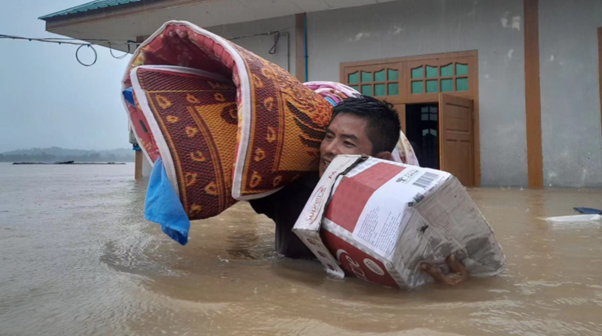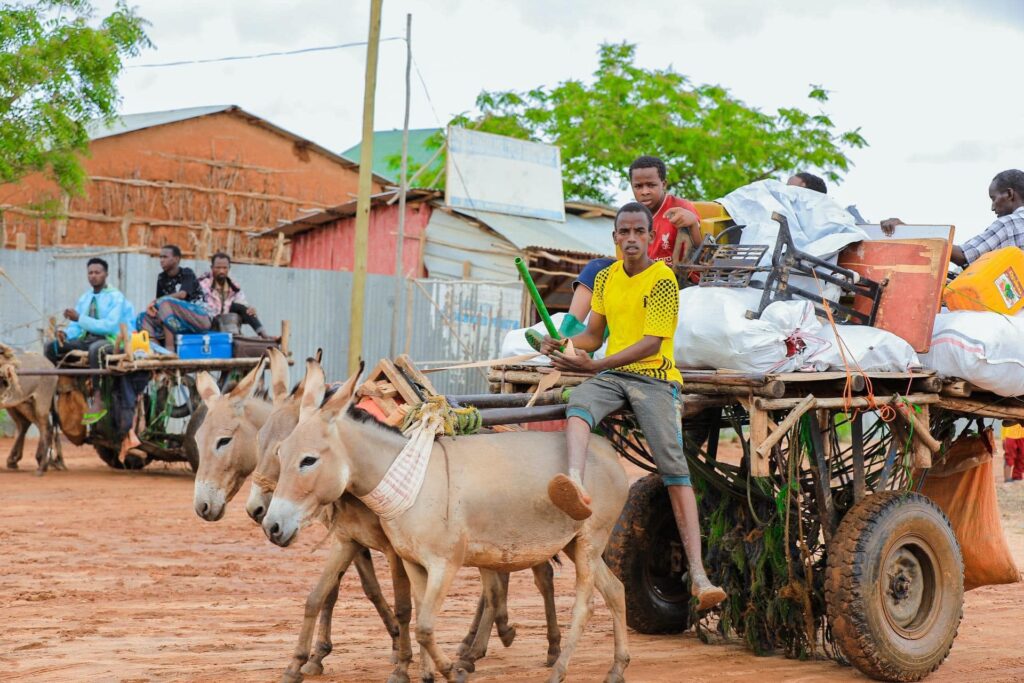
Pictured above: Our team in Myanmar evacuate the office after flooding.
The way we understand and talk about the climate crisis has evolved significantly. What once was framed as ‘global warming,’ a term newly added to public vocabulary and perceived as a niche concern for ‘nature lovers,’ is now widely acknowledged as a very real and pressing risk to human wellbeing, almost universally described as a crisis. We now have a clear understanding of just how interlinked human and planetary health are… but that is far from the whole story.
The climate crisis is global, but its impacts are unequal. Those who contribute the least—nations in the Global South, Indigenous people, and marginalised communities—are facing the biggest impacts of the multitude of crises that come with the climate crisis.

Pictured above: Disruption caused by floods in the Somali region of Ethiopia last December, over 1
million people were affected.
The Unequal Burden of the Climate Crisis
While we are starting to see the impacts here in the Global North—such as storm Milton in the US and the flooding in Valencia—the effects remain far starker in the Global South. We are exploring the ways that the climate crisis has affected the communities we work with throughout our Planetary Health appeal this winter.
This disparity arises from several factors: actual environmental changes tend to be harsher in these regions, the capacity to adapt or respond is often limited by capital, and a higher proportion of livelihoods and economies in the Global South are connected to the environment. This year, every country we work in noted climate change as a growing challenge, adding extra layers of difficulty to achieving health justice for these communities.
While marginalised communities are disproportionately affected, they are also burdened with a significant share of the responsibility for protecting biodiversity, a cornerstone of a healthy climate. This responsibility comes with immense personal risks. Corporations and industries causing environmental harm prioritise profits; silencing outspokenness before addressing their real impact. The killing of, and human rights abuses faced by, land defenders such as Berta Cáceres, Honduran indigenous leader murdered in 2016, and Chut Wutty, Cambodian environmental activist murdered in 2012, illustrate the peril faced by people, especially from indigenous communities, who stand up against destruction of their land, air, water or livelihoods.
Furthermore, the climate crisis has largely been driven by the actions of a few industries and governments that are structured to benefit privileged groups in the Global North. These countries will not only be among the last to feel the effects of the climate crisis due to their geography but have also accumulated wealth that allows them to mitigate its impacts in the short term. Note: this mitigation often comes at a cost to the Global South, where labour and natural resources are exploited to sustain unsustainable practices.
Systems of Exploitation
This dynamic mirrors colonialism. Historically, wealth and power were extracted from colonies in the Global South for the benefit of colonial powers in the Global North, leaving a legacy of inequality and underdevelopment. The same patterns are evident in the way the climate crisis is unfolding (above), and how resources and labour in the Global South being exploited to sustain lifestyles and industries in the Global North.
If you are interested in learning more about this, this is a great resource: Colonialism, climate change and climate reparations.
The Way Forward
The climate crisis must be understood as more than an environmental issue; it is a multifaceted challenge requiring expansive solutions. Scientists cannot solve this crisis in isolation, especially when they are not being listened to by those with power.
Real progress requires cross-sectoral collaboration and interdisciplinary learning and innovation. Leaders, organisations and those in power must listen to the voices of the most marginalised people and actively engage in and facilitate partnerships that bridge sectors and disciplines.
Change, in this respect, means addressing systemic inequalities and finding innovative ways to adapt and respond to the crises that are already happening. This winter, we are exploring how HPA is working towards climate justice through initiatives that tackle health inequities and empower vulnerable communities on the frontlines of the climate crisis.
Climate justice is the only way we can ensure health justice. It is an essential framework we must work within to tackle the interconnected climate and health challenges, while dismantling the lingering structures of colonialism that continue to shape global inequities.
By addressing these deeply rooted issues, we can work toward a fairer, healthier, and more sustainable future. The time for action is now—for the health of our planet and all of us who call it home.

